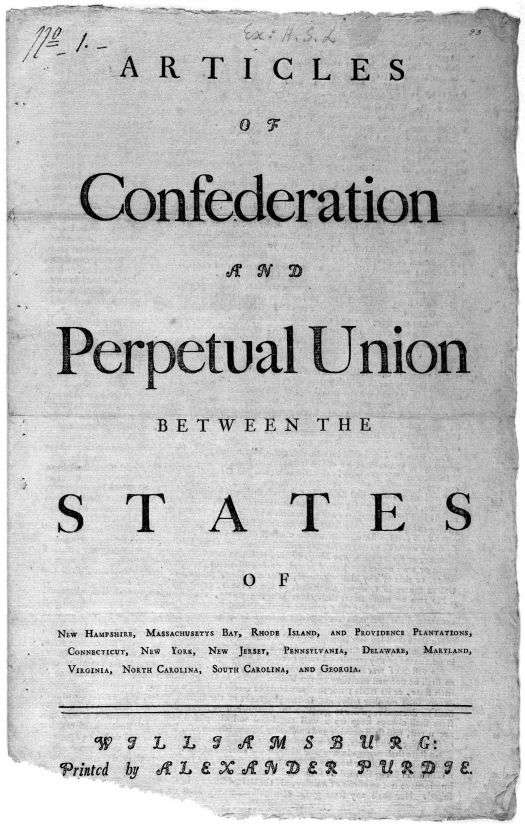The Volokh Conspiracy
Mostly law professors | Sometimes contrarian | Often libertarian | Always independent
Today in Supreme Court History: July 13, 1787
7/13/1787: The Articles of Confederation Congress enacts the Northwest Ordinance.

Editor's Note: We invite comments and request that they be civil and on-topic. We do not moderate or assume any responsibility for comments, which are owned by the readers who post them. Comments do not represent the views of Reason.com or Reason Foundation. We reserve the right to delete any comment for any reason at any time. Comments may only be edited within 5 minutes of posting. Report abuses.
Please to post comments


Nothwest Ordinance, one of our Organic documents and what does it say :
Article 3 of the the Northwest Ordinance of 1787:
Religion, morality and knowledge being necessary to good government and the happiness of mankind, schools and the means of education shall forever be encouraged.
And ...?
And your ignorance might be excusable but not necessarily
[now comes the extensive apologia...wait for it as Justice Jackson says ]
The Northwest Ordinance was of special importance to antebellum thought. It was a fundamental precedent of liberty and self-government.
It had multiple precedents of liberties found in the Bill of Rights, including free exercise of religion.
Education is stated as fundamental for "good government and the happiness of mankind."
A provision that had good intentions but of limited success, promised "utmost good faith shall always be observed towards the Indians; their lands and property."
Two slavery related provisions were also foreshadowed:
There shall be neither slavery nor involuntary servitude in the said territory, otherwise than in the punishment of crimes whereof the party shall have been duly convicted: Provided, always, That any person escaping into the same, from whom labor or service is lawfully claimed in any one of the original States, such fugitive may be lawfully reclaimed and conveyed to the person claiming his or her labor or service as aforesaid.
The discerning would note the text of the Thirteenth Amendment. Nonetheless, it also protected the reclaiming of fugitive slaves. The Fugitive Slave Clause was far from controversial for the day. Massachusetts ended slavery in the 1780s. It still protected the right of slaveowners to retrieve fugitive slaves.
The provision also has the same euphemism for slavery.
https://www.archives.gov/milestone-documents/northwest-ordinance
The Constitutional Convention was in the process of crafting a new framework of government. This one led to Ohio, Indiana, Illinois, Michigan, and Wisconsin—also, part of Minnesota.
The Northwest Territory had a non-voting congressional delegate for a short period of time. The first such delegate, however, represented the Southwest Territory.
https://sgp.fas.org/crs/misc/R40555.pdf
The Fugitive Slave Clause of the Constitution was phrased a bit differently. Note too that even though this provision spoke of "any person escaping into the same, from whom labor or service is lawfully claimed," it did use the word "slavery."
The Constitution avoided that until the 13th Amendment.
The Confederate Constitution didn't.
This is actually a great insight because the Confederates had to drop 'the higher law background of the Constitution" to do that, no self-evident truths, no natural law, etc.
and that is what almost all modern discussion, from the barroom to the SCOTUS chambers misses. I know how I sound to some but this has been a specialist study of mine for more than 5 years.
many scholars though say it was intentional to state that the slave must be returned AND not to mention whose responsibility that was. I am convinced
I think more concern should be had about the Articles of Confederation, including its text and the acts pursuant to it.
I am not aware of a good book that provides a comprehensive discussion of such matters. There are short books about the Articles of Confederation out there. Nothing very comprehensive akin to the myriad of books about the U.S. Constitution.
The coverage usually briefly talks about the AOC being crafted and ratified & then skipping to the problems that led to a felt need for the Constitution.
A detailed discussion of how it was written and ratified and how the country was governed in the 1780s under its terms is left out. The Constitution is discussed without reference to the AOC, including provisions there of clear relevance.
The congressional handling of territorial matters would be a significant issue here. For instance, Abraham Lincoln references it in his famous Cooper Union Address.
There's a legal academic career there for sure.
Fully agreed. We need more books about this period.
I’m slowly working through The Creation of the American Republic, 1776-1787, but I’m still in the Revolutionary period, rather than the Articles of Confederation. I do recommend it, based on what I’ve read so far.
Try https://oll.libertyfund.org